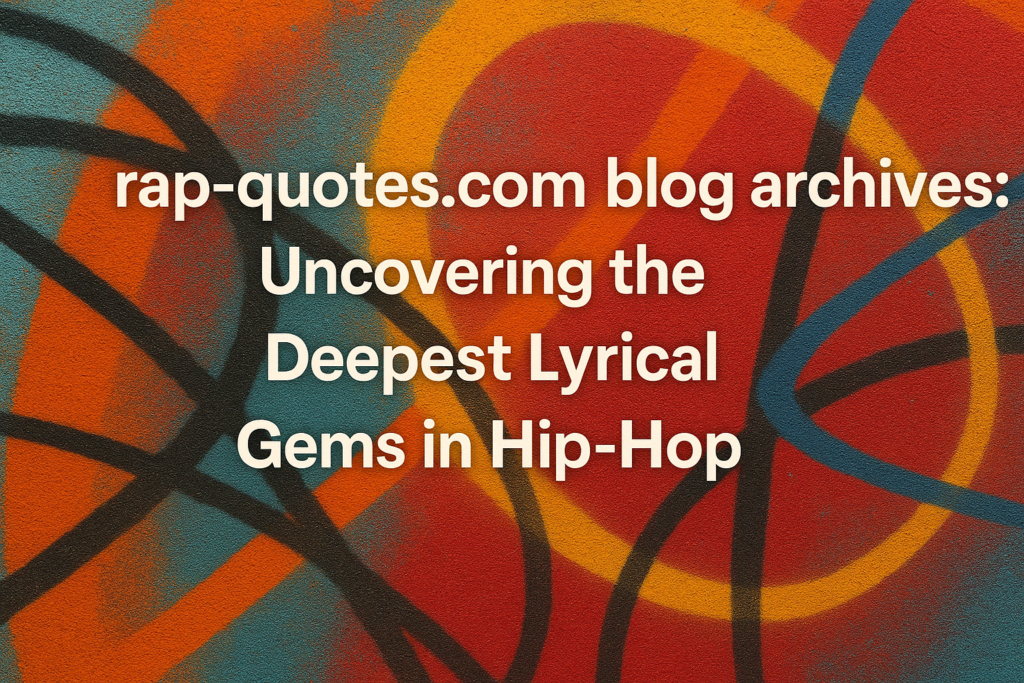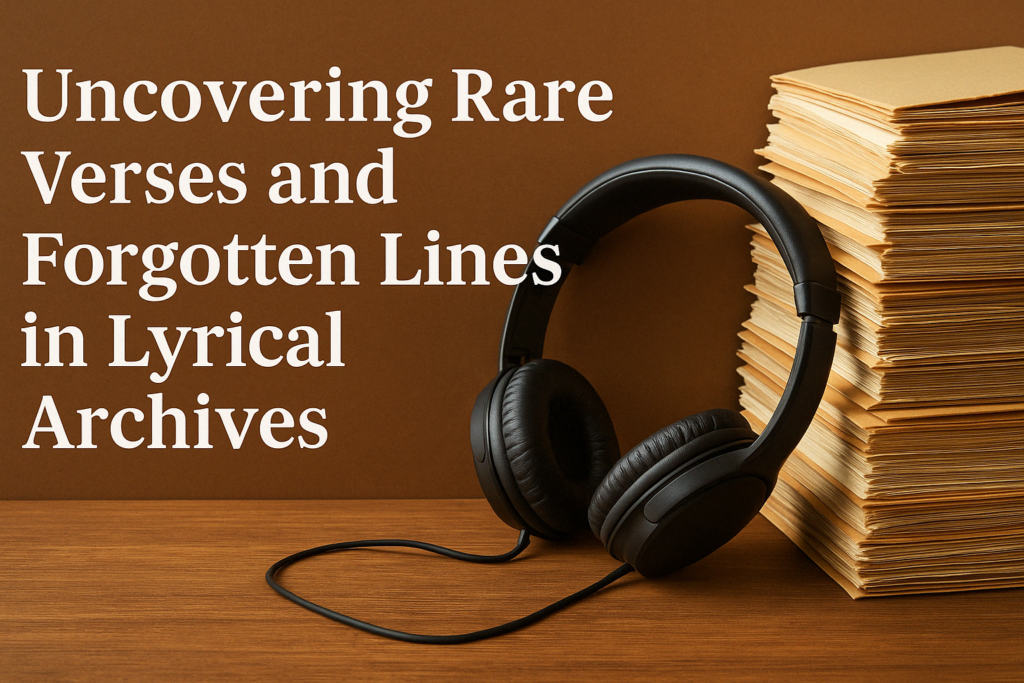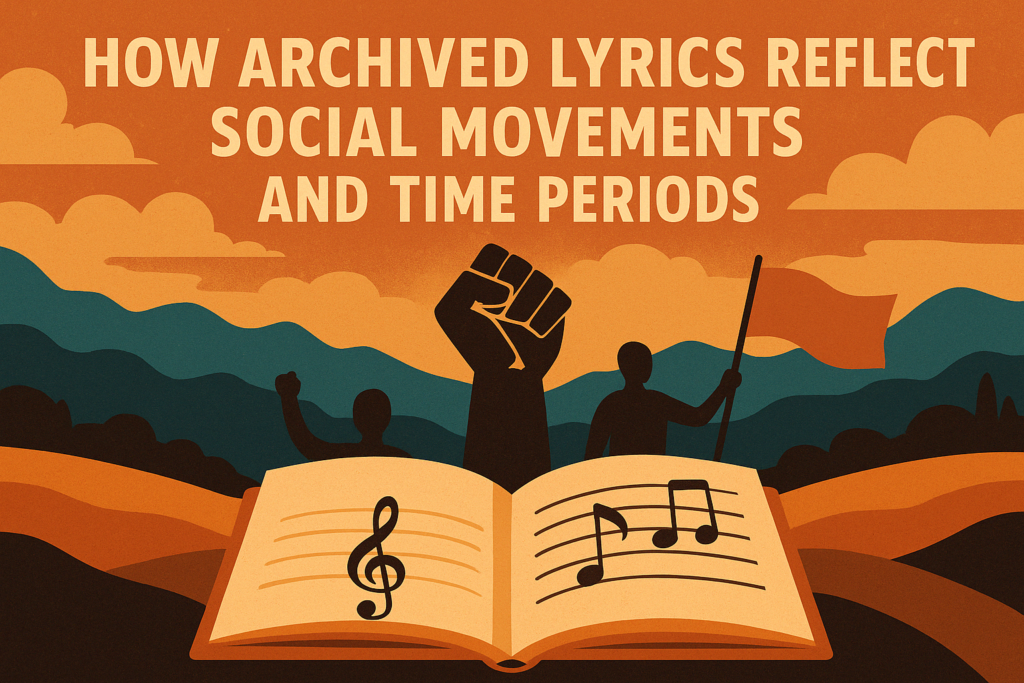Rap and hip-hop are more than musical genres—they are poetic expressions of reality, survival, hope, and rebellion. The rap-quotes.com blog archives provide a powerful platform to revisit and analyze these expressions in their rawest form. With thousands of handpicked lyrics, contextual insights, and artist references, this archive is a digital monument to hip-hop’s lyrical richness.
Let’s take a detailed look at how these archives serve fans, educators, researchers, and cultural observers alike. Each section below unfolds a unique purpose the blog serves.
rap-quotes.com blog archives: A Vault of Hip-Hop Wisdom
The rap-quotes.com blog archives are not just a random collection of lines—they are organized repositories of lyrical insight from rap’s greatest minds. These archives include lyrics from various time periods, genres, and subcultures within hip-hop.
They are categorized not only by artist or album but also by theme, like empowerment, street justice, love, money, and mental health. This thematic layout helps readers easily explore quotes according to the message they seek.
Beyond the quotes, the blog provides context—what was happening when the lyric was written, what the rapper meant, and how it was received. This depth transforms a single line into a complete story.
For educators and scholars, this makes the site a useful tool for studying modern language, urban sociology, and black cultural expression.
The wisdom in these archives goes beyond catchy phrases; it’s intellectual and emotional currency.
rap-quotes.com blog archives: Discovering the Minds Behind the Rhymes
Each rap line represents a mindset. The rap-quotes.com blog archives celebrate this by showcasing not just the lyrics but the people behind them. From old-school pioneers to modern lyricists, the site covers a wide array of artists.
By exploring rapper bios, interview links, and behind-the-scenes commentary, readers learn what shaped these lyricists. What were their influences? What were they battling at the time of writing?
This approach makes the lyrics more personal and relatable. Readers can connect with the artist as a human being—not just as a celebrity or performer.
The blog often includes embedded audio or performance videos, making the experience even more immersive.
Whether you’re looking into Tupac’s philosophy or J. Cole’s quiet brilliance, this platform opens the door.
rap-quotes.com blog archives: From Street Anthems to Cultural Commentary
Some of the most iconic rap lyrics are about more than rhyming—they reflect real-world issues. In this way, rap-quotes.com blog archives stand out by presenting quotes that double as cultural commentary.
You’ll find verses touching on systemic racism, gentrification, political injustice, and poverty. These are lyrics that mirror social struggles and spark movements.
What’s powerful is that the blog doesn’t just display them—it frames them within their historical and social relevance. For example, a lyric from Public Enemy is linked to its relevance during the crack epidemic. A Nas quote is connected to 90s urban politics.
This archive becomes a teaching tool—ideal for researchers, students, and even activists seeking lyrical documentation of past and present issues.
It’s where music meets sociology.
rap-quotes.com blog archives: Chronicling the Evolution of Bars and Beats
The evolution of rap is documented not just through beats and production—but through language. From old-school to mumble rap, the change is obvious and important. These changes are chronicled well in the rap-quotes.com blog archives.
Readers can explore how rhyme schemes, vocabulary, and subject matter shifted over time. There’s a noticeable difference between the street rhymes of Rakim and the introspective flows of Kendrick Lamar.
This progression is well documented with examples from different decades. You can visually track how language and slang evolved, and how certain themes became more or less popular.
The blog often highlights these shifts with side-by-side comparisons and visual graphs. It’s a journey through hip-hop linguistics.
Understanding the evolution of bars is also a way to understand how hip-hop has grown as a voice for different generations.
Why Rap Quotes Matter in Pop Culture and Daily Inspiration
Rap lyrics have infiltrated mainstream pop culture. From fashion to films, from social media to speeches—rap quotes are everywhere. They’re short, powerful, and full of attitude.
Many of these quotes are used for motivation and self-belief. Lines like “Started from the bottom, now we here” or “Can’t knock the hustle” inspire millions every day.
This explains why corporate brands and influencers often borrow these lines. They resonate deeply and are instantly recognizable.
The blog explains the origin of many such famous quotes and breaks down why they caught on. It also warns against misinterpretation—because sometimes a quote taken out of context can lose its original power.
In essence, the blog treats rap not just as entertainment, but as a tool for inspiration and branding.
How Archived Lyrics Reflect Social Movements and Time Periods
Hip-hop has always been tightly bound to history. Every decade brought new struggles—and rap adapted accordingly. The archived lyrics reflect these eras like historical timestamps.
For instance, post-9/11 rap became more introspective. Lyrics in the early 2000s shifted toward identity, faith, and nationalism. Similarly, the Black Lives Matter movement influenced artists to speak more openly about police brutality.
The blog maps these transitions with real lyrical examples. For educators, this is extremely useful in teaching music as a form of political and social commentary.
These archives serve as a time capsule, allowing future generations to learn about the past through powerful verses.
Breaking Down the Influence of Top Rappers Through Their Words
Rappers don’t just make hits—they set trends, influence culture, and shape language. The blog explores how leaders like Jay-Z, Nicki Minaj, Kanye West, and more left an imprint on fans and future rappers.
Quotes are examined not only for their creativity but for the impact they had. For example, Jay-Z’s business-focused bars changed how fans viewed success. Tupac’s poetic justice still fuels activism today.
The blog breaks this down in simple language. It also includes citations of artists who quoted each other or built on past lyrics.
It’s a lyrical lineage that shows how hip-hop is a generational dialogue.
Preserving Authenticity: The Role of Archival Blogs in Hip-Hop
In a world of AI-generated lyrics and viral snippets, authenticity is at risk. That’s why platforms like rap-quotes.com blog archives matter—they ensure the original quote, source, and meaning are preserved.
Each lyric is posted with attention to accuracy. Misquoted lyrics can lead to misinformation about an artist’s intention or message. The blog works to avoid this.
Moreover, the blog serves as a protection zone for the culture itself. It preserves the voices of marginalized communities and their real stories.
Without archives like this, hip-hop’s history could be rewritten incorrectly.
Uncovering Rare Verses and Forgotten Lines in Lyrical Archives
The blog goes beyond the Billboard hits. It dives deep into lesser-known tracks, mixtapes, freestyles, and unreleased material. This is where some of the most profound lines live.
These rare gems often carry deeper meaning because they weren’t made for commercial success—they were honest, raw, and personal.
By unearthing these quotes, the blog adds depth to our understanding of artists. It shows that brilliance isn’t only in the spotlight.
Fans who enjoy “digging in the crates” will especially love this feature.
How Educational and Motivational Quotes From Rappers Inspire Readers
Rap is no longer just a music genre—it’s also used in classrooms, therapy sessions, and self-help guides. Educators now use quotes from rappers to connect with students and explain complex topics.
For example, a lyric about growing up in hardship can spark a meaningful classroom discussion about inequality. A line about success through struggle can motivate someone facing challenges.
The rap-quotes.com blog archives make it easy to find these quotes and their explanations. It’s a powerful tool for schools, youth centers, and even personal development coaches.
Last Word
The rap-quotes.com blog archives are more than a quote collection—they’re a preserved voice of generations who turned pain, pride, and purpose into poetry. Every line holds meaning, whether it’s a hard truth or a hopeful vision.
These archives help us understand how rap speaks on real-life struggles while shaping language and pop culture. Each quote echoes the mood of its time and the soul of its speaker.
From casual readers to deep researchers, the blog opens doors to cultural, historical, and emotional insights that mainstream media often overlooks. It’s both a reference guide and a storytelling platform.
Ultimately, the rap-quotes.com blog archives remind us that words matter—and in hip-hop, they echo far beyond the beat.
Also Read:
fashionisk .com Global Reach: How to Build Your Wardrobe with Budget-Friendly, Stylish Picks
#mobilecreativeorg: The Rise of Mobile-First Creativity Worldwide
Numa Zara Builds a Community-Driven Brand Through Influencer Micro-Models
Xlecz and Smart Cloud Integration: How It Simplifies Infrastructure Without Compromising Innovation












